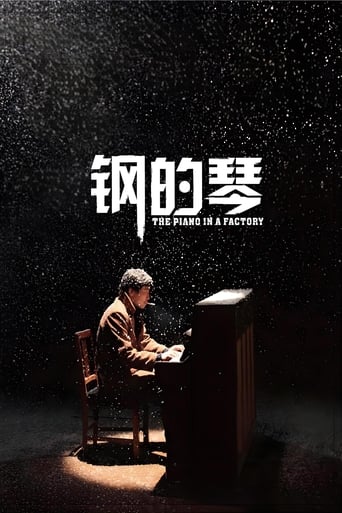IslandGuru
Who payed the critics
Solidrariol
Am I Missing Something?
Comwayon
A Disappointing Continuation
Robert Joyner
The plot isn't so bad, but the pace of storytelling is too slow which makes people bored. Certain moments are so obvious and unnecessary for the main plot. I would've fast-forwarded those moments if it was an online streaming. The ending looks like implying a sequel, not sure if this movie will get one
lasttimeisaw
THE PIANO IN A FACTORY, is the second film from the young Chinese writer-director Meng Zhang, and had made a splash when its leading actor Qianyuan Wang won a coveted BEST ACTOR AWARD at Tokyo International Film Festival in 2010, but delayed for half a year until its theater release, it crashed and burned in the box office which stimulated another shouting diatribe on the unhealthy status quo which bars art-house films from seizing a sizable piece of cake in the prosperous mainland cinema market. Without a booming front-loaded attendance, these movies will be replaced by more popular fares merely within a few days of release thanks to cinema managers' money-seeking priority. Four years have passed, the situation may not ameliorate too much, Meng's follow-up THE UNCLE VICTORY (2014) has just won Grand Jury Prize in this year's Shanghai International Film Festival and soon will be pushed to test the water. However, in retrospect and after finally watched his 2010 output in a sub-par DVD copy, the film does has its own unique demographic target, and relies heavily on our generation's nostalgia. The story is set in the early 90s, an industrial town in northeast China, a former steel factory employee Guilin (Qianyuan Wang) decides to make a steel piano from scratch (with the help from his blue-collar fellows and a retired scientist as the brain) in order to keep his daughter Xiaoyuan (Xingyu Liu) from choosing her gold-digging mother after the divorce. The premise itself sounds both self-deceptive and self-motivating, as his girlfriend Shuxian (Hailu Qin) pierces to the truth with her pertinent remark, there is no guarantee he can win Xiaoyan's custody even they could complete the piano. Indeed, it is exactly what Meng intends to tell his audience, to build a piano is not a solution but a means to evoke us to feel sympathetic to a disappeared era, as overtly exhibited in the smokestacks-demolishing scenes with the tableaux reminds us of Mao's time. One devoted characteristic is the miscellany of 90s Chinese pop melodies, Soviet folk songs and even jingles from the vintage Nintendo video games, which is profusely grafted on various scenarios (from funeral to wedding ceremony, as Guilin forms an amateurish band to make ends meet), and perilously borders on over-exploitation; the cinematography is constantly panning horizontally, conjures up some fluid mobility which heartily generated from everyday drollness under the perpetually murky and melancholy light and derelict settings. Qianyuan Wang and Hailu Qin are convincingly submerging into their characters and efficiently reveal their inner sentiments with certain verve. The remainders are mostly non-pro actors in aid of the project due to its measly budget, all bathe with real-life authenticity except one grating presence of South Korean actress Shin-yeong Jang (apparently a casting proviso from the film's Korean executive producer, Jae-young Kwak), who plays Guilin's ex-wife and is utterly devoid of credibility as an ex-worker and an illiterate, there are nuances to tell Chinese from South Koreans, although through a westerners' eyes, it would not be so conspicuous. So in a nutshell, Meng greatly encapsulates the zeitgeist of the time and it is a sound step for him to emerge as a bona-fide sculptor of a bygone time, only if he could minus a shade of the overblown sentimentality and tone down all the fanfare to meet the eyes and bombard the ears, this picture would connect more audience out of the millions middle-age nostaglist originate from Northeastern region in China.
richardtrombly
What to do when you are out of work, out of money and out of luck in Dongbei (China's Northeast) and you need a piano? You call on all of your friends, who are just as down and out as you are and you make one yourselves. How hard could that be? Zhang Meng followed up his first film Lucky Dog with another heartwarming and bittersweet comedy film about small town life in Northeastern China, where once thriving communist steelworks have long closed and left much of the population unemployed. I have to say that this is one of the best movies, from any country, that I have seen this year. In The Piano in a Factory, Zhang presents Chen (Wang Qian-Yuan) a father trying hard to raise his daughter as a single dad by playing in a band at weddings and funerals. He is separated from his estranged wife (Jang Shin-Yeong) who has met a wealthy lover and they struggle for custody of of their daughter. The only thing the couple can agree on is that they want their musically talented daughter to play the piano. Chen can not afford one but as the divorce approaches, his wife decides that the daughter can't stay with him if he can't get a piano for her. After trying begging, borrowing and stealing, he enlists the community of his entire network of friends to apply the skills they once plied as proud tradesmen in the mills and factories and build a piano from scratch in the abandoned mill before it is torn down. Their struggle to make do with almost nothing is as tender as it is funny. Without the funds to purchase the needed hardwood, the steelworkers decide to make an all-steel piano. As a backdrop to this tale is the dissolution of the traditional way of Chinese life, represented by twin smoke stacks slated for demolition. The townsfolk petition to save them, even as Chen tries to hold together the remnants of his family life. But the towers come down to make way for new construction which is happening all over China. The most touching and comic feature is the familiar and warm way Zhang portrays the village folk. Each of them is flawed and has their weaknesses, but Zhang shows a real community with real heart (and petty gossips and small squabbles.) The strength of that community is that when one of its members is in need, they drop everything and pull together, but not perhaps without some complaints. This often comical story of a community of friends (and sometimes enemies) coming together to help each other out in need is deeply inspiring. Zhang provided a well balanced and well paced narrative with a solid story. The drama remained low key, but was well played. Solid cinematography by Shu Chou added to Zheng's simple narrative. Nothing was cleaned up for this film as it presented a real and very gritty poverty of much of rural China, but unlike the last generation of filmmakers, showing real China does not mean showing China in a bad light. All of the characters are never-do-well folk and they live in poverty but you feel that they are all lovable in their own way and doing the best they can. It is be interesting to see how this young movie maker matures and influences the voice of the new wave of independent film makers from China. Director: Zhang Meng Writer: Zhang Meng Producers: Kwak Jae-Young, Choi Gwang-Suk, Jessica Kam Cinematographer: Shu Chou World Premiere: October 2010 (Toronto International Film Festival)
tara-906-89901
This is definitely one of my favorite Chinese films - and I've seen many. It's a simple story, beautifully told, about complex characters. Each of the quirky characters is beautifully drawn, and their goals and relationships skillfully interwoven.Never is the storytelling compromised for a cheap laugh. The cinematic language seems to draw it's influences from the stage and silent films and bold cinematic risks are taken that all work.I appreciated the intimate insight into the workings of relationships (guanxi) between men. They trade cigarettes, favors and gifts constantly - in exactly the way I've read happens in industrial towns. But the film explains this fascinating flow of goods and services inside private relationships with unselfconscious authenticity. For me the biggest highlight - and what really elevated this film to the realm of 'all time best' - was the use of Russian elements in the score and narrative. China's relationship with Russia is so complex and interesting and standing shoulder to shoulder like old comrades, they were nothing short of perfect. For anyone with a genuine interest in China I highly recommend this film. Tara
yuki zhang
a reminder of the 80's China. this is something only a Chinese could understand and shed tears for. the absurdity and humor is trying to make it simple, direct and easy , but we know its wound inside. we know from our heart that those skilled working people, our parents, that diligent whole generation, was casualty of a disaster called PARTY. yet they fought for their children, with bare hand. i still remember how my father fix every one of my broken toys. how my grandfather made me rabbit lantern every year with paper, bamboo and some glue. and it's pretty also. at that time, to me, they are all god-like-fixer who can do whatever magic they do to make my wishes come true. in that age, there's only one rule. all of them can afford nothing fancy because of the economy, but they can build things single-handed. they will fight to hell for what their children longs for.just like the movie. exactly, precisely just like that.





